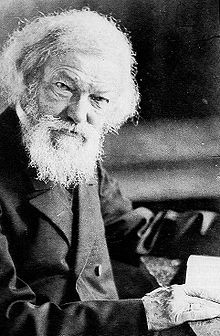Julius Kühn
You can help expand this article with text translated from the corresponding article in Swedish. (May 2012) Click [show] for important translation instructions.
|
Georg Krücken | |
|---|---|
| Born | September 21, 1962 Bad Honnef |
| Died | September 21, 1962 (aged 52) |
| Alma mater | University of Bielefeld, University of Bologna |
| Occupation(s) | Sociologist, Higher education researcher |
| Known for | Director of INCHER-Kassel |

Julius Gotthelf Kühn (23 October 1825 – 14 April 1910) was a German academic and agronomist and he was one of the pioneers of plant pathology.[1] Kuhn's father was a land owner and he gained experience in agriculture and botany on his father's land. He was trained in Bonn, starting at age 30 and was awarded his doctorate, which focused on diseases of beet and canola at Leipzig. In 1862, he became a professor of agriculture at the University of Halle. Kuhn published more than 70 papers on mycology and plant pathology over the course of his career.
One of his seminar papers was the 1858 publication "Die Krankheiten der Kulturgewächse".
He was honoured in 1898, when botanist Paul Wilhelm Magnus circumscribed Kuehneola, which is a genus of rust fungi in the family Phragmidiaceae.[2]
References
[edit]- ^ Aisnworth GC. (1981). Introduction to the History of Plant Pathology. Cambridge University Press. ISBN 0-521-23032-2.
- ^ "Kuehneola Magnus, 1898". www.gbif.org. Retrieved 21 May 2022.
- ^ International Plant Names Index. J.G.Kühn.
- 1825 births
- 1910 deaths
- Academic staff of the University of Halle
- German agronomists
- Members of the French Academy of Sciences
- Recipients of the Order of Franz Joseph
- Recipients of the Order of Saint Stanislaus (House of Romanov)
- People from Pulsnitz
- People from the Kingdom of Saxony
- German academic biography stubs
